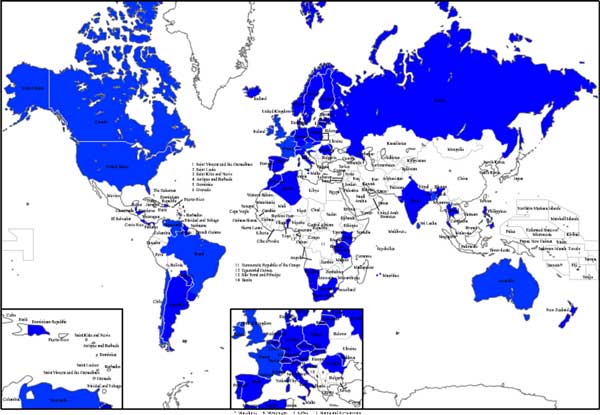
International understanding of sexual harassment
The United Nations General Recommendation 19 to the Convention on the Elimination of all Forms of Discrimination against Women defines sexual harassment of women to include:
“such unwelcome sexually determined behavior as physical contact and advances, sexually colored remarks, showing pornography and sexual demands, whether by words or actions. Such conduct can be humiliating and may constitute a health and safety problem; it is discriminatory when the woman has reasonable ground to believe that her objection would disadvantage her in connection with her employment, including recruitment or promotion, or when it creates a hostile working environment.”
Sexual Harassment at Workplace Laws around the world
Over 50 countries have prohibited sexual harassment at work through national legislation or labour codes. India became one of these countries in 2013. The countries that have enacted such legislations are as follows: Algeria, Argentina, Australia, Austria, Bangladesh, Belgium, Belize, Benin, Brazil, Britain, Canada, Chile, Costa Rica, Croatia, the Czech Republic, Denmark, the Dominican Republic, Fiji, Finland, France, Germany, Guyana, Honduras, Iceland, India, Ireland, Israel, Italy, Japan, the Republic of Korea, Kenya, Latvia, Lesotho, Lithuania, Luxembourg, Malta, Mauritius, Morocco, Namibia, the Netherlands, New Zealand, Norway, Panama, Paraguay, the Philippines, Poland, Portugal, Romania, Russia, Slovakia, South Africa, Spain, Sri Lanka, Sweden, Switzerland, Thailand, Tanzania, Uruguay, Venezuela.
It is interesting to see how different countries have different understanding of sexual harassment – which is to a great extent influenced by their culture and understanding of gender equality.
Legislations in some countries
India:
The Sexual Harassment of Women at Workplace (Prevention, Prohibition and Redressal) Act, 2013 was passed by both the LokSabha and the RajyaSabha and got the assent of the President recently and has become law. This Act deals with protecting women from harassment in the workplace and providing a safe environment. India took 50 years to come up with a definition for what constitutes sexual harassment in the workplace, courtesy of a Supreme Court judgment 12 years ago.(Visakha v. State of Rajasthan). The act uses the definition of sexual harassment as laid down in Visakha. Section 15 of the Act determines the level of compensation to be paid to the woman who has been sexually harassed. The main criticism of this law is that it is not gender neutral. According to this act, only a woman can file a complaint. Also, sexual harassment is a crime under the Indian Penal Code and the penalties range from 1 to 3 yrs imprisonment and/ or fine. You can know more about the law and various compliances related to it by taking up this course which is created by National University of Juridical Sciences. You can also learn about implementation of sexual harassment laws by taking up this course.
Australia:
Under Australian Law, a person who sexually harasses someone else is primarily responsible for their behaviour. However, in many cases the company also be held vicariously liable for sexual harassment by the employees, agents and contractors, unless it can show the steps that it took to prevent the sexual harassment from occurring. Under the Sex Discrimination Act, the employer must take all reasonable steps to minimize the risk of discrimination and harassment occurring. The Sex and Age Discrimination Legislation Amendment Act 2011 amended the Sex Discrimination Act 1984 in May 2011 to expand the protections against sexual harassment.The victim can make a complaint to the Australian Human Rights Commission in case he/she has been sexually harassed. The Commission will then investigate the complaint and will try to resolve the complaint through a process of conciliation, during which it will help the two parties involve by acting as an impartial person. If the complaint is not resolved, then the victim can take the complaint to Court.
Britain:
The Acts that are applicable in Britain if you are subjected to sexual harassment at work are the Sex Discrimination Act and the Employment Rights Act. The Sex Discrimination Act makes it unlawful for employers in Great Britain to subject someone to sexual harassment. The act also makes it unlawful to harass a transsexual person because they intend to undergo, are undergoing, or have undergone gender reassignment. Sexual harassment itself is prohibited by the Sex Discrimination Act but, in many instances, it will be accompanied by other forms of unfavorable treatment such as not being recruited, criticism of work, lack of promotion, enforced transfer and ill health or dismissal. The Employment Equality (Sex Discrimination) Regulations 2005 amended the Sex Discrimination Act in 2005. The new law extends the protection of sex discrimination rules to cover sexual harassment.
Zimbabwe:
Sexual harassment is considered to be an unfair labour practice according to the Zimbabwe Labour Relations Act. The country has a national gender policy to deal with such issues. As it is an unfair labour practice, victims of sexual harassment can report offences through the Labour Officers who are in charge of conciliation of employment-related disputes and unfair labour practices. The victim may also appeal to the Labour Court.A victim of sexual assault also has the right to press separate criminal and/or civil charges against an alleged perpetrator.
Brazil:
In 2001, the Brazilian Government enacted a criminal law (Law No 10.224) defining sexual harassment as an embarrassing conduct performed by a worker in a superior hierarchical position against someone hierarchically inferior at work, in order to obtain advantages or sexual favours. The law made sexual harassment a crime with imprisonment from one upto two years. This legislation has set Brazil apart from most countries where harassment is dealt with under civil law.
Germany:
Under the Protection of Employees Act, Employers and managers shall be required to protect employees against sexual harassment at the workplace and also both male and female employees can file a complaint if they are sexually harassed. Employees affected shall have the right to complain to those responsible in the enterprise or the department if they feel that they have been sexually harassed. The employer has an obligation investigate the complaint and take appropriate measures to prevent the harassment from continuing. If the employer fails to do so, or applies measures which are obviously inadequate, the employees who are harassed shall have the right to suspend their activity at the workplace concerned, without loss of wages or salary, for as long as this is necessary for their protection.
Denmark:
Sexual harassment is defined as, when any verbal, non-verbal or physical action is used to change a victim’s sexual status against the will of the victim and resulting in the victim feeling inferior or hurting the victim’s dignity. Man and woman are looked upon as equal, and any action trying to change the balance in status with the differences in sex as a tool, is also sexual harassment. In the workplace, jokes, remarks, etc., are only deemed discriminatory if the employer has stated so in their written policy. Women are viewed as being responsible for confronting harassment themselves, such as by slapping the harasser in the face. Law number 1385 of December 21, 2005 regulates this area.
Spain:
The Spanish Labour Act provides certain guarantees against sexual harassment. These rights include protection against physical or verbal conduct that may constitute sexual harassment. Under a recent amendment, s. 54.2.g of the Labour Act considers sexual harassment at work place as a breach of the employment contract and hence it is valid clause to dismiss the harasser.
Sources
http://www.mywage.org/zimbabwe/main/decent-work-check/fair-treatment/sexual-harassment
http://blogs.reuters.com/india/2012/11/23/sexual-harassment-bill-need-for-a-gender-neutral-law/
http://www.ituc-csi.org/IMG/pdf/Harcelement_ENG_12pgs_BR.pdf
http://ndemoliner-law.com/2011/05/10/sexual-harassment/
http://news.bbc.co.uk/2/hi/americas/1253870.stm
http://www.humanrights.gov.au/sexual-harassment-information-employers
http://www.humanrights.gov.au/sexual-harassment-information-employees
http://www.ilo.org/dyn/natlex/docs/WEBTEXT/39143/64941/E94DEU02.htm#a10
http://www.wikigender.org/index.php/Sexual_Harassment_Legislation#Denmark
http://www.whatishumanresource.com/sexual-harassment-different-countries
 Serato DJ Crack 2025Serato DJ PRO Crack
Serato DJ Crack 2025Serato DJ PRO Crack










 Allow notifications
Allow notifications


